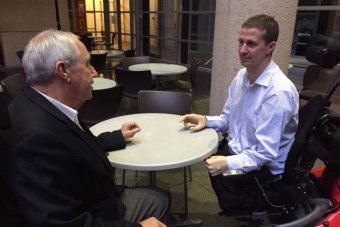Researchers at the University of Queensland are embarking on a global search for the next new antibiotics which they say is a race against time to fight drug-resistant superbugs.
Superbugs are invading hospitals and threaten to return society to a pre-antibiotic period where even simple infections caused death.
Leading the charge is Professor Matt Cooper from UQ’s Institute for Molecular Bioscience (IMB).
“This is really about saving lives,” he said. “We’re well aware that the superbugs are coming and starting to rise and affect a lot of people globally — it’s time to fight back.
“We want to work together as a community, find better antibiotics and we need to start to look at diagnostics seriously.”
My limbs had to be removed to keep me alive and that’s the type of thing that happens if we haven’t got the ability to stem infection. If we can prevent somebody from going through what I went through then that would be a wonderful thing.
Matthew Ames
Professor Cooper said scientists around the world made millions of compounds each year, many of which just sat on shelves.
Most were not designed as antibiotic drugs and therefore had never been screened for their potential antibiotic use.
The not-for-profit group is calling on scientists to send their compounds to IMB for free testing against superbugs and to ensure they are not also harmful to human cells.
“We’re really finding the first starting point. What’s that compound? How does it work?” he said.
“How can we then build on that and work that into a compound that can be used by doctors to save lives?
“It’s early days, but it’s very promising.”
The results will be available to the research community around the world, with the team establishing an open access database.
‘I’m really very lucky to be alive’
Matthew Ames, 42, has become an antibiotics awareness advocate after contracting streptococcal infection three years ago.
Superbugs: what are they?

Antibiotics, once heralded a miracle of modern medicine, have become so over-used most are no longer effective. The result is the rise of the superbug.
His body went into toxic shock and to survive doctors had to amputate his arms and legs.
“Effectively my limbs were dying from the ends and producing a lot of toxins that were killing my body,” he said.
“That’s why my limbs had to be removed to keep me alive and that’s the type of thing that happens if we haven’t got the ability to stem infection.”
Mr Ames has had his new prosthetic hands for just 48 hours and is still learning how to use them.
But the antibiotics doctors used at the time have had serious side effects, causing initial problems to his kidneys and severe hearing problems.
“Superbugs are more super because of what they can do to you,” he said.
“They can be really quite common and what happens if they get out of control — if the common ones get resistant to antibiotics — then we’re in a lot of trouble.
“I’m really very lucky to be alive. For me, if we can prevent somebody from going through what I went through then that would be a wonderful thing.”
WHO regards superbugs as greatest threat to human health
Queensland Health Minister Cameron Dick said the program — Community for Open Antimicrobial Drug Discovery (CO-ADD) — would have an impact not just in Australia but around the world.
“This is the smart state becoming smarter,” he said.
“It’s very sobering to think that the WHO regards superbugs as the greatest threat to human health, so the world-class research that’s being done here will have the benefit hopefully to save lives around the world.”
Mr Dick said superbugs were a challenge for all health systems and that he would look at best practice interstate as well as talking with clinicians to find ways of improving hygiene in hospitals.
It’s becoming harder and harder to find new antibiotics. We’re at the last resort where we’ve gone back to very old compounds that are quite dirty and cause a lot of harm to hearing, to kidneys, and we’re forced to use those.
Professor Matt Cooper
“We need the next Howard Florey, we need the next Alexander Fleming [scientists who discovered penicillin],” he said.
“I hope that’s a Queenslander to lead the way in developing these new compounds.”
Professor Cooper said Australian Bureau of Statistics figures showed 170 Australians died each week from bacterial sepsis, costing the health system about $1.3 billion a year.
“It’s becoming harder and harder to find new antibiotics,” he said.
“We’re at the last resort where we’ve gone back to very old compounds that are quite dirty and cause a lot of harm to hearing, to kidneys, and we’re forced to use those.”
‘Time to act is now’
Professor Cooper said time was running out and that in 10 or 20 years’ time society could return to the age before antibiotics where one in three Australians died from infections before they reached 30.
“Things like hip replacements, chemotherapy — they won’t be possible any more because we currently use antibiotics to stop those people who are immuno-compromised getting an infection,” he said.
“The time to act is now.”
He said scientists also wanted to expand the program to influenza, tuberculosis and dengue fever — threats which used to be tropical diseases but were coming more readily into Australia.
The program is being supported by global charitable foundation the Wellcome Trust.
Chemists can submit their compounds or find out more information on www.co-add.org


